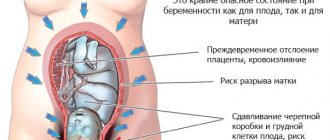There can be many reasons for overeating: stressful situations, get-togethers with friends, birthdays and other feasts, eating too quickly, frequent dry snacks in front of the computer, etc. In fact, the rhythm of life itself does not always leave it possible to monitor nutrition. This is especially difficult for women who perform several social roles at the same time. During the day you need to do work, in the evening you need to be a wife and mother. And in the evening, finally, when all the work is done, you can take time for yourself.
This is how irregular snacks, dry food, etc. arise. Even if in the evening you tried to eat a full hot meal, and not just another sandwich, the desired food can often lead to discomfort in the stomach. An unexpectedly large portion of food, especially in the evening, can be a difficult task for digestion.
Overeating may be accompanied by unpleasant symptoms:
- discomfort, heaviness in the stomach;
- bloating, seething;
- flatulence;
- nausea;
- lethargy and apathy.
Pharmacological properties of the drug Creon
Creon contains pancreatin of porcine origin in the form of enteric-coated (stable in acidic environment) minimicrospheres in gelatin capsules. The capsules dissolve quickly in the stomach, releasing hundreds of mini-microspheres in a multi-dose manner, which ensures good mixing with the stomach contents, transport from the stomach along with its contents and, after release, good distribution of enzymes within the intestinal contents. When the minimicrospheres enter the small intestine, the shell quickly dissolves (at pH 5.5), releasing enzymes with lipolytic, amylolytic and proteolytic activity, which ensures the breakdown of fats, carbohydrates and proteins. The products of pancreatic digestion are then absorbed either immediately or after further hydrolysis by intestinal enzymes. In animal studies, there was no evidence of enzyme absorption in unchanged form, and therefore classical pharmacokinetic studies were not performed. Pancreatic enzyme supplements do not require absorption to be effective. On the contrary, their full therapeutic effect is manifested in the lumen of the gastrointestinal tract. Moreover, as substances of protein origin, they undergo proteolytic cleavage while passing through the gastrointestinal tract before being absorbed in the form of peptides and amino acids. Data from preclinical studies do not indicate acute, subchronic or chronic toxicity.
Basic recommendations
If you overeat, you can use the following recommendations:
- Mineral water. To relieve the feeling of heaviness in your stomach, slowly drink small sips of still or lightly carbonated mineral water at room temperature.
- Warm teas. Unsweetened black, green or mint tea can stimulate intestinal motility and the production of digestive enzymes.
- Taking medications to improve digestion. Such preparations are also called pancreatin enzyme preparations because they contain the same enzymes that are produced naturally in humans. Thus, in their composition they are related to our body.
The active ingredient in most enzyme preparations is pancreatin. But does this mean that there are no differences between them?
Few people know that for enzyme preparations the release form is of key importance, namely the particle size of the preparation. The smaller the particles, the higher the effectiveness of the drug2,3.
Creon® is produced in capsules, which contain small particles - minimicrospheres4. When it enters the stomach, the capsule quickly dissolves4, and the minimicrospheres are mixed with food, covering its maximum amount.
This action distinguishes Creon® from other drugs to improve digestion, for example, in the form of tablets. The tablet is a single piece. The idea that it can be divided or kneaded is wrong, since this breaks the protective shell of the drug, and the active substance will “die” in the stomach. Since the tablet remains intact, it cannot be mixed evenly with food. This means that the drug can only partially process what you eat, so the symptoms may not go away completely. That is why the presence of small particles is one of the key properties for pancreatin enzyme preparations.
Indications for use of the drug Creon
Insufficiency of exocrine pancreatic function in adults and children caused by the following conditions:
- cystic fibrosis,
- chronic pancreatitis,
- pancreatectomy,
- gastrectomy,
- pancreas cancer,
- operations involving gastrointestinal anastomosis (for example gastric resection according to Billroth II),
- obstruction of the pancreatic or common bile duct (for example by a tumor),
- Shwachman-Diamond syndrome and other diseases accompanied by exocrine pancreatic insufficiency.
Benefits of Creon®
- Supplements own digestion4
- The capsule contains small particles - minimicrospheres for complete digestion of food4
- The capsule dissolves quickly in the stomach4
- Begins to work in the intestines within 15 minutes after entering it2
It is best to take Creon® capsule during or immediately after a meal4, such as a large lunch or dinner. This is necessary because in our physiology everything is arranged in a similar way: the body produces its own enzymes during every meal. Creon® supports its own digestion, and therefore, when taking it, the body does not stop digesting food itself5.
The drug Creon® can be taken every time the consequences of overeating occur - heaviness and discomfort, bloating, rumbling, seething. Creon® is suitable for the whole family and even for children from birth4.
You can read more about the drug in this section, and you can learn more about digestion here.
Use of the drug Creon
The dosage of the drug Creon is based on the individual needs of the patient and depends on the degree of indigestion and the composition of the food. To determine an adequate individual dose, there are three doses of the drug - Creon 10000, Creon 25000, Creon 40000. It is recommended to take the drug with meals. Capsules and minimicrosphere granules should be swallowed whole, without chewing, and washed down with a sufficient amount of liquid. If the capsule cannot be swallowed whole (children and the elderly), it can be opened and mini-microsphere granules can be added to liquid food that does not require chewing, or to a liquid with a neutral or slightly acidic environment (yogurt, grated apple, etc.). This mixture should be taken immediately and not stored. During treatment with Creon 10000, Creon 25000, Creon 40000, it is very important to drink enough fluid, especially during periods of increased fluid loss. A lack of fluid can cause constipation. Dosing for cystic fibrosis : - the initial dose for children under 4 years of age is 1000 IU lipase / kg body weight during each meal and for children over 4 years of age - 500 IU lipase / kg body weight during each eating. The dose should be individualized based on disease severity, control of steatorrhea, and maintenance of adequate nutritional status. The maintenance dose for most patients should not exceed 10,000 IU lipase/kg body weight per day. Dosing for other types of exocrine pancreatic insufficiency : - the dose must be selected individually, depending on the degree of digestive disturbance and the fat composition of food. The usual starting dose is 10,000 to 25,000 units of lipase with each main meal. However, it is possible that some patients require higher doses to eliminate steatorrhea and maintain adequate nutritional status. General clinical practice suggests that at least 20,000–50,000 units of lipase should be consumed in the diet. The dose during main meals (breakfast, lunch or dinner) can range from 20,000 to 75,000 IU of lipase, and with additional light meals between main meals - from 5,000 to 25,000 IU of lipase.
Kreon® 10000 (Kreon® 10000)
Inside.
Doses of the drug are selected individually depending on the severity of the disease and the composition of the diet.
Capsules should be taken during or immediately after each meal (including snacks), swallowed whole, not broken or chewed, and washed down with sufficient liquid.
If swallowing is difficult (for example, in young children or elderly patients), the capsules are carefully opened and the minimicrospheres are added to soft, non-chewable food that has a sour taste (pH < 5.5), or taken with a liquid that also has a sour taste ( pH < 5.5). For example, minimicrospheres can be added to applesauce, yogurt, or fruit juice (apple, orange, or pineapple) with a pH less than 5.5. It is not recommended to add the contents of the capsules to hot food. Any mixture of minimicrospheres with food or liquid cannot be stored and should be taken immediately after preparation.
Crushing or chewing minimicrospheres, or mixing them with food or liquid with a pH greater than 5.5, can destroy their protective enteric coating. This can lead to early release of enzymes in the mouth. decreased effectiveness and irritation of mucous membranes. You need to make sure that there are no mini-microspheres left in your mouth.
It is important to ensure that the patient maintains adequate fluid intake, especially if there is increased fluid loss. Inadequate fluid intake may cause or worsen constipation.
Dose for adults and children with cystic fibrosis
- The dose depends on body weight and at the beginning of treatment should be 1000 lipase units/kg per meal for children under four years of age and 500 lipase units/kg per meal for children over four years of age and adults.
— The dose should be determined depending on the severity of symptoms of the disease, the results of control of steatorrhea and maintenance of adequate nutritional status.
- In most patients, the dose should remain less than or not exceed 10,000 lipase units/kg body weight per day or 4000 lipase units/g fat consumed.
Dose for other conditions accompanied by exocrine pancreatic insufficiency
The dose should be set taking into account the individual characteristics of the patient, which include the degree of digestive insufficiency and the fat content of food. The dose required by the patient with the main meal varies from 25,000 to 80,000 units of lipase, and half the individual dose when taking a snack.
In children, the drug should be used as prescribed by a doctor.
Special instructions for the use of the drug Creon
In patients with cystic fibrosis who took high doses of other pancreatin preparations, narrowing of the ileocecal intestine and colon (fibrosing colonopathy), as well as colitis, was noted, but controlled studies failed to provide evidence of an association between taking Creon and the occurrence of fibrosing colonopathy. However, as a precautionary measure, it is necessary to exclude the possibility of damage to the colon in the event of unusual abdominal symptoms or a change in the nature of the symptoms of the underlying disease, especially if the patient is taking more than 10,000 IU lipase/kg/day. Use during pregnancy and lactation. Due to the fact that there is no clinical trial data on the effect of pancreatic enzymes on the course of pregnancy, the drug should be prescribed with caution during pregnancy. Animal studies have shown no evidence of absorption of pancreatic enzymes. Thus, the possibility of toxic effects on reproductive function and fetal development is excluded. Since animal studies indicate that there is no systemic exposure to pancreatic enzymes in women during breastfeeding, no effect on the breastfed infant has been identified. Children. Creon can be used for children. The ability to influence the reaction rate when driving a vehicle or while working with other mechanisms. There is no data on the negative effect of the drug Creon on the ability to drive vehicles or operate other mechanisms.
Why do these symptoms occur?
Symptoms of overeating can occur when the body does not have enough digestive enzymes to digest food. This does not mean that there are no enzymes of our own. It is more correct to say that the body’s own strength is enough for the usual amount of food, but not for extra food eaten, unusually heavy or fatty.
The main cause of heaviness after eating is fats, because they are the most difficult to digest1.
Digestive enzymes are a special type of compound designed to break down carbohydrates, proteins and fats for subsequent absorption in the body.
Systematic overeating can negatively affect not only the state of the digestive system, but also the body as a whole. The appearance of unpleasant symptoms can affect mood and activity: you want to lie down so that no one touches you, but you need to meet with friends, pay attention to loved ones, etc. What to do if you ate more than you planned? In such cases, it is important to support the natural digestive process to cope with unpleasant symptoms.









